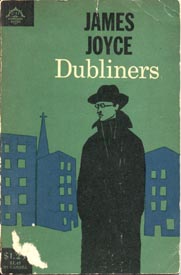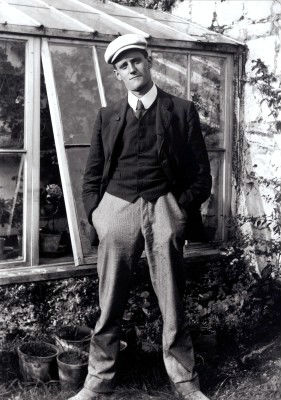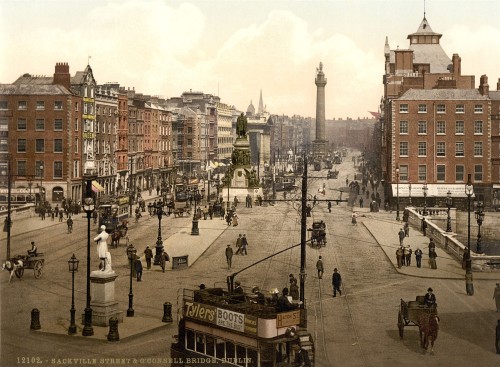
Introducing a new feature! Weekly or quasi-weekly postings of short stories followed by a few observations/thoughts on the story – they’ll all be available online, and discussion is (highly) encouraged for those who are inclined.
 As an opening salvo, I thought we’d look at “An Encounter” from James Joyce’s Dubliners, a beautiful little composition set in the city of Dublin and written in the early twentieth century. The story deals with two young boys who set off on a day of adventure in the big city. As such, it’s a tale of youthful idealism running up against the realities of the adult, everyday world, and it cuts straight to the heart of the Law/Grace dynamic in how we perceive daily life. For those who want to read along, it’s pretty short and available to read here.
As an opening salvo, I thought we’d look at “An Encounter” from James Joyce’s Dubliners, a beautiful little composition set in the city of Dublin and written in the early twentieth century. The story deals with two young boys who set off on a day of adventure in the big city. As such, it’s a tale of youthful idealism running up against the realities of the adult, everyday world, and it cuts straight to the heart of the Law/Grace dynamic in how we perceive daily life. For those who want to read along, it’s pretty short and available to read here.
“It was Joe Dillon who introduced the Wild West to us” – the boys find entertainment and escape from a strict education and upbringing in staging mock-battles after classes. The problem with childhood fantasy, or career ambition, or any other form of fantastic mythology is that it leads quickly to the desire for more. In the boys’ case, the pressure to actually be living the life of the Wild West sours their after-school games, until “the mimic warfare of the evening became at last as wearisome to me as the routine of school in the morning because I wanted real adventures to happen to myself. But real adventures…must be sought abroad.”
So the boys decide to break out of the closed circle of weary school life and fulfill their ambition to see the broader world, to experience it, encounter something outside themselves and new. They chase other boys, stage mock-sieges, but then Joyce’s critique of fantasy intervenes.
Fantasy has a twofold structure: on the one hand, it always pushes toward the individual’s participation in an epic story arc. The book of Revelation, for instance, is a cosmic fantasy (a comment on genre rather than how literal/true it is) which allows the reader to imaginatively participate in a higher reality, something outside of and beyond him/herself. On the other hand, however, fantasy tends towards self-absorption and solipsism. The fantasy of a promotion, for instance, builds a narrative that risks contextualizing everyone around you as mere stepping-stones toward fulfilling a selfish goal. The first tendency of fantasy draws someone out into a larger world; the second tendency risks drawing the entire world into an individual’s desire (one reason, incidentally, why Christianity has often interpreted ‘concupiscence’ in terms of sex).
In Joyce’s story here, the fantasy of being Wild West-type figures draws the boys out into the larger world, but then they become disappointed when greater Dublin is merely itself: a bustling city that by its nature will not allow the boys to the center of attention, a bastion of real, everyday life where the Wild West ambitions of two kids abut the grounded reality of everyday adult life. In this sense, it’s a coming-of-age story, but a somewhat more negative one than the traditional bildungsroman.
Joyce talks a lot about gnomon, a literary technique where things are made implicit rather than explicit – events can be inferred from the shadow they cast, like the shadow of a sundial which is rife with information. The central movement of the story, to my mind, happens when the boys become disappointed by their adventure – the mood changes drastically in the span of two paragraphs:
Mahony said it would be right skit to run away on one of those big ships…School and home seemed to recede from us and their influences upon us seemed to wane.
…When we were tired of this sight we wandered slowly into Ringsend
The logical conclusion of any fantasy is complete escape, and the boys pursue this to its conclusion. They search for their high role-playing ambitions at home and get bored, then they run up against the ‘regularness’ (Christopher Moltisanti) of everyday life in the broader city, and they are brought to the natural next step of wanting to abscond from the entire country. They’re not the first characters to do this; Joyce’s nearly-unbearable Stephen Daedalus from Portrait of an Artist actually does this, and Joyce consciously lampoons his ambitious egotism at the book’s end. The boys, however, are too young for this, so they become tired once their escapism has fully played itself out and (literally) exhausted itself.
 The famous part of the story is their encounter with a strange older man but, to my mind, the ‘flop’ and the ‘turn’ have already happened and their encounter with the lecher is just the natural next step. He’s set the reader up for this scene with his earlier critique of self-referential fantasy, or imaginative stories that always point back to oneself. The irony, of course, is that the boys escape the closed circle of mundane school life only to find that their ambition has closed the circle again – a bigger circle, but still impervious to any true experience beyond themselves (again, Joyce was often pretty negative). Experientially, the Augustinian/Lutheran idea that we’re ‘curved in on ourselves’ (incurvatus in se) means that it’s nearly impossible to have any encounters beyond the self.
The famous part of the story is their encounter with a strange older man but, to my mind, the ‘flop’ and the ‘turn’ have already happened and their encounter with the lecher is just the natural next step. He’s set the reader up for this scene with his earlier critique of self-referential fantasy, or imaginative stories that always point back to oneself. The irony, of course, is that the boys escape the closed circle of mundane school life only to find that their ambition has closed the circle again – a bigger circle, but still impervious to any true experience beyond themselves (again, Joyce was often pretty negative). Experientially, the Augustinian/Lutheran idea that we’re ‘curved in on ourselves’ (incurvatus in se) means that it’s nearly impossible to have any encounters beyond the self.
After talking with the boys about their ‘sweethearts’, the man walks off a ways and does something bizarre and presumably indecent – Joyce leaves it up to the reader to figure out, and we have some indications in the psycho-sexual change that comes over the man when he rejoins the group. During this encounter, Joyce paints an devastating picture of solipsism, the idea that each individual is hopelessly trapped in his/herself, a theme which has been central for twentieth-century fiction:
There was nothing he liked, he said, so much as looking at a nice young girl…he gave me the impression that he was repeating something which he had learned by heart or that, magnetised by some words of his own speech, his mind was slowly circling round and round in the same orbit…He repeated his phrases over and over again, varying them and surrounding them with his monotonous voice.
Chilling! It’s almost as if Joyce (who was intellectually immersed in Catholic Christianity) is invoking the vocabulary of Christian anthropology here, the closed circles of each individual life, the desire to break out of them. The narrator, too, remains closed in upon himself – the makes a point of saying that he never raised his eyes from a spot on the ground, and when his friend Mahony tries to point something out to him, the narrator “neither answered nor raised my eyes.”
Experientially, original sin can refer to the way we interpret phenomena, or encounters, in daily life. The doctrine of original sin explains how everything becomes self-referential, hampering our access to a reality beyond the self. The older man views the boys as an occasion for self-expression, and the narrator is lost in thought, incapable of even looking when Mahony twice points out an absurdity. The Law/Grace issue here is between experience that is acquired and experience which is received as a gift.
 Theologically, sexuality is grounded in an encounter beyond oneself – the two great ‘others’ that Adam encounters in the garden are God and Eve, and the answer to Adam’s loneliness is the creation of another person. In eating the fruit, Adam instrumentalizes God’s purposes to his own ambition (‘you will be like God’), so the curse of original sin is our propensity to draw the entire world into our selfhood, as Adam did with God. Because sex is the archetypal encounter beyond oneself, it’s useful to the biblical writers as a symbol for encounter with God (Song of Songs), and it’s useful to Joyce as the archetypal symbol of solipsism, or betrayal of this encounter beyond oneself. The old man has taken archetypal encounter and transformed it into archetypal solipsism, a fact that Joyce takes great pains to express in the passage quoted above (‘magnetised’ by himself, ‘slowly circling round and round in the same orbit’).
Theologically, sexuality is grounded in an encounter beyond oneself – the two great ‘others’ that Adam encounters in the garden are God and Eve, and the answer to Adam’s loneliness is the creation of another person. In eating the fruit, Adam instrumentalizes God’s purposes to his own ambition (‘you will be like God’), so the curse of original sin is our propensity to draw the entire world into our selfhood, as Adam did with God. Because sex is the archetypal encounter beyond oneself, it’s useful to the biblical writers as a symbol for encounter with God (Song of Songs), and it’s useful to Joyce as the archetypal symbol of solipsism, or betrayal of this encounter beyond oneself. The old man has taken archetypal encounter and transformed it into archetypal solipsism, a fact that Joyce takes great pains to express in the passage quoted above (‘magnetised’ by himself, ‘slowly circling round and round in the same orbit’).
The story’s title of ‘An Encounter’ makes it clear that experiential encounter is the subject of his story. The man’s solipsism with regard to sex is merely an archetypal symbol of the solipsism of original sin, which the boys participate in in their encounters with Dublin (from the standpoint of Wild West fantasy) and which leave them weary and exhausted once this fantasy fails and they cannot escape daily life on the ship. So the narrator, too, is solipsistic.
How is this solipsism broken? The Law urges the negative form of fantasy, by which we try to acquire identity. Because this identity rests upon our own efforts (fantastic-sexual for the man, fantastic-narrative for the boys), it can never provide anything beyond solipsism. The answer to breaking solipsism must come in the form of given-ness, or experiences beyond our control.
Theologian/brother-of-repute Simeon Zahl developed the idea that the Holy Spirit works in negative experiences, like disappointment or agitation, because those experiences come independently of ourselves. The lecher, in this story, abruptly drops in upon the boys, and their unsettling conversation with him ends up being the given experience that overcomes solipsism. The redemption comes at the end when, unsettled by the genuine, unsought encounter with the man, the narrator is forced outside of himself – terrified, our narrator runs toward his friend:
How my heart beat as he came running across the field to me! He ran as if to bring me aid. And I was penitent, for in my heart I had always despised him a little.
The abrupt, unasked-for experience unearths a need in the narrator, and his friend, whom he had always despised just a little, suddenly becomes a rescuer. Once a jarring (given!) experience breaks open the closed circle of ambition and writing our own narratives, need for rescue breaks to the surface. An obvious parallel can be made to the deconstruction provided by the Law and suffering and the ability to accept Christ when we see him afresh, running as if to bring us aid.
As a final note, there’s a hilarious scene in Virginia Woolf’s Mrs. Dalloway when a woman is trying to get her self-absorbed husband to notice a plane writing letters in the sky – very much a novelty in her day. Her husband is debilitatingly anxious and over-intellectual, and his doctor gives her the following prescription:
Dr. Holmes had told her to make her husband (who had nothing whatever seriously the matter with him but was a little out of sorts) take an interest in things outside himself.
Again, from an experiential standpoint, this “interest” is the fruit of grace. We’ll see it played out in O’Connor’s theme of violent grace and in some of Faulkner’s more Christian characters. This ‘interest’, again, is the fruit of the Holy Spirit through deconstructive experiences in life but, it’s worth noting, is a primary goal of short stories, which aim to provide genuine, half-hour ‘encounters’ with different worlds. Check back next week for a short story that, to my mind, accomplishes this – Flannery O’Connor’s classic “A Good Man is Hard to Find”.

COMMENTS
2 responses to “Short Story Wednesdays: “An Encounter” by James Joyce”
Leave a Reply















I hope you will continue this series. I believe (as many do) that literature has the ability to enable us to truly see life through someone else’s point of view. If we let it, I believe this can help us in our Christian walk. Thanks for a great beginning.